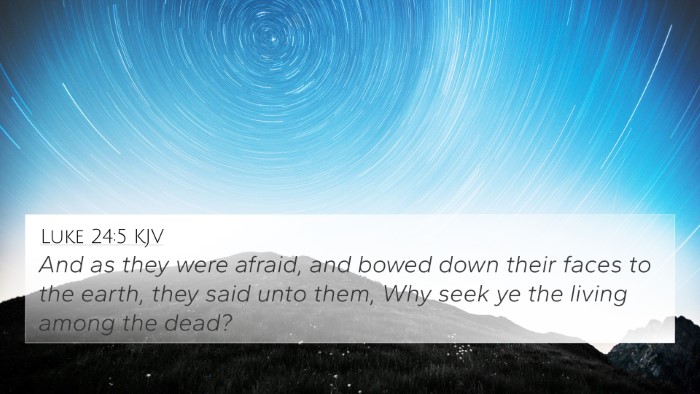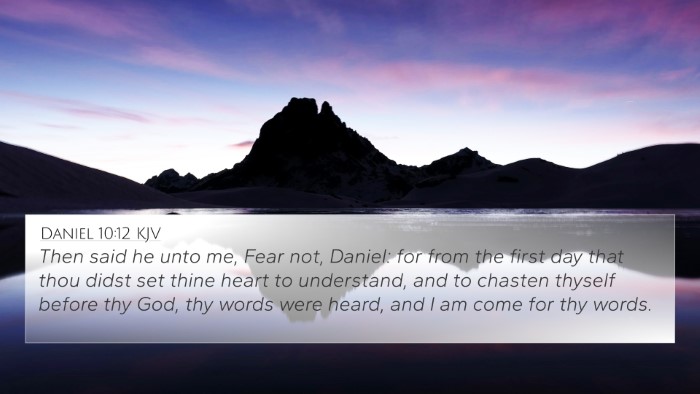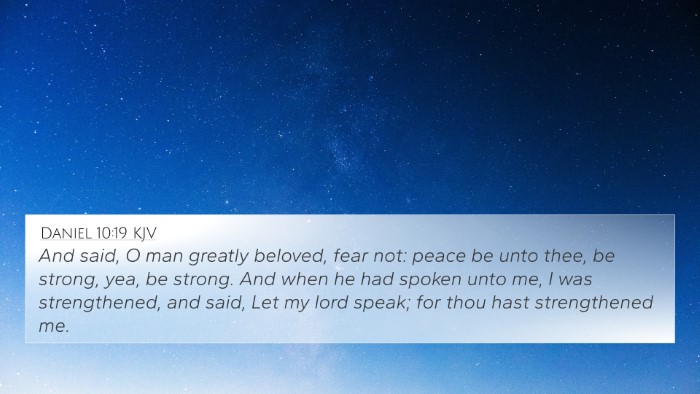Understanding Matthew 28:5
Matthew 28:5 states: "But the angel answered and said to the women, 'Do not be afraid, for I know that you seek Jesus who was crucified.'" This verse comes at a critical moment in the resurrection narrative, where the angel comforts the women visiting the tomb.
Verse Meaning Overview
This verse serves as a profound statement of reassurance and revelation. The angel’s message acknowledges the women’s fear, and simultaneously affirms their quest for Jesus after His crucifixion. This duality encapsulates the transition from despair to hope, marking the essence of the resurrection event.
Commentary Insights
Matthew Henry's Commentary
According to Matthew Henry, the angel's assurance, "Do not be afraid," highlights God's desire to alleviate our fears, especially in times of mourning or profound distress. He notes that the acknowledgment of the women's search for Jesus emphasizes the importance of faith and recognition of Christ, even when His presence seems absent.
Albert Barnes' Commentary
Albert Barnes emphasizes the significance of the angel's gentle admonition to not fear, demonstrating the nature of divine messengers who come to comfort and provide clarity in confusing times. He also points out that the angel confirmed their search was not in vain, as Jesus had risen, encapsulating the victory over death.
Adam Clarke's Commentary
Adam Clarke elaborates on the implications of the statement, indicating that the knowledge of the angel regarding the women’s intentions reassures believers of God's omniscience. The acknowledgment of their search for Jesus is profound, as it reveals the deep longing of disciples even amidst sorrow.
Bible Verse Cross-References
- Mark 16:6: The angel tells the women that Jesus has risen.
- Luke 24:5-6: The women are reminded that Jesus said he would rise again.
- John 20:13: Mary Magdalene speaks to angels at the tomb.
- Matthew 27:61: The women witnessed Jesus’ burial, showing their devotion.
- Isaiah 26:19: A prophetic declaration of the resurrection of the dead.
- Romans 6:4: The symbolic relationship of baptism to the resurrection of Jesus.
- 1 Corinthians 15:55-57: Death is conquered through the resurrection.
Thematic Bible Verse Connections
The theme of hope triumphing over fear is prevalent in scripture and ties directly to Matthew 28:5. Several verses echo this theme:
- Psalm 56:3: Expresses confidence in God amidst fear.
- Philippians 4:6-7: Encourages believers to be anxious for nothing, indicating divine peace.
- Isaiah 41:10: God’s promise of help and comfort in fear.
Connections Between Bible Verses
Exploring Matthew 28:5 through the lens of comparative Bible verse analysis opens a dialogue that links the Old and New Testaments. The cross-referencing of these verses reveals a tapestry of faith that spans the entirety of scripture:
- Hebrews 2:14-15: Jesus’ victory over death correlates directly with the message delivered by the angel.
- Revelation 1:18: Jesus declares victory over death and holds the keys of Hades, reinforcing the message of Matthew 28:5.
Scriptural Cross-Referencing Techniques
For those seeking deeper understanding, utilizing a Bible cross-reference guide can illuminate connections between various scriptures. These tools enable readers to:
- Find cross-references for Matthew 28:5.
- Identify connections between the Old and New Testament related to resurrection themes.
- Engage in detailed cross-reference studies between the Gospels about the resurrection narratives.
User Intent & Engagement
When exploring the interconnectedness of scripture, readers often seek to understand what verses are related to significant passages. Matthew 28:5 provides a rich ground for such explorations through:
- This verse’s encouragement amidst fear.
- Exploring parallels in resurrection themes.
- Cross-referenced themes such as hope and faith across scripture.
Conclusion
In summary, Matthew 28:5 is not merely a narrative detail but a pivotal moment that reassures believers of the victory of Christ over death. This verse, supported by various commentaries and cross-references, invites a deeper investigation into its implications. Utilizing tools for Bible cross-referencing enriches the study of scripture and reveals the interconnectedness of biblical truths.

















